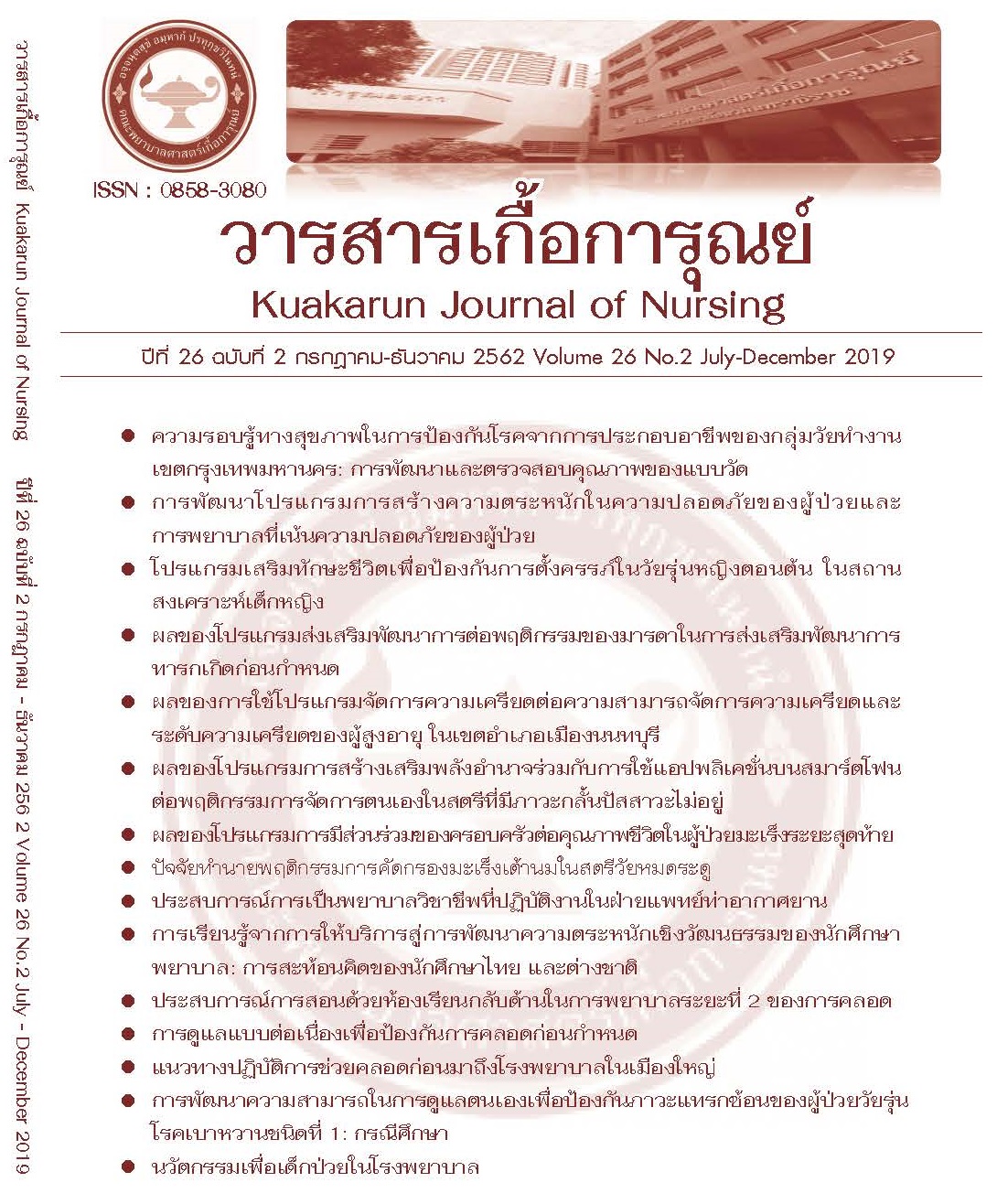Effects of the Developmental Promoting Program on Mothers’ Behavior to Promote Development of Premature Infants
Main Article Content
Abstract
Premature newborn is a group of babies with high risk for developmental delays. Promoting maternal behavior on promoting development of premature infants is cricial. The purpose of this quasi-experimental two-group repeated post-intervention is to examine effects of the developmental promoting program on mothers’ behavior to promote development of their premature infants. A purposive sampling was used to recruit 20 mothers with first-born baby prematurity at gestational age between 28-36 weeks. During the data collection, the babies were corrected age 0-2 months and admitted at a Sick Newborn Unit of a Taksin hospital in Bangkok. Data were carried out from December 2017 to March 2018. The participants were assigned into the experimental and the control group of 10 mothers for each group. The experimental group received the developmental promoting program while the control group received usual care. The research instruments for collecting data consisted of a demographic questionnaire and the maternal behavior on promoting development questionnaire with its reliability of .84 Data were analyzed by using descriptive statistics, Chi-square test, Independent t-test and repeated measures ANOVA.
The results revealed that within the experimental group, a total mean score of maternal behavior on promoting development of premature infants at both post-intervention and one-month follow-up significantly higher than prior to beginning the intervention. After completion of the intervention, the experimental group had the total mean score of maternal behavior significantly higher than those in the control group (p < .05). These findings indicate that this developmental promoting program is effective. Nurses who responsible to care for mothers and premature babies could utilize to promote proper mothers’ behavior to on promote development of premature infants.
Article Details
References
จันท์ฑิตา พฤกษานานนท์. (2551). การติดตามทารกแรกเกิดที่มีปัจจัยเสี่ยง. ใน นิชรา เรืองดารกานนท์, ชาคริยา ธีรเนตร, รวิวรรณ รุ่งไพรวัลย์, ทิพวรรณ หรรษคุณาชัย และนิตยา คชภักดี (บรรณาธิการ). ตำราพัฒนาการและพฤติกรรมเด็ก (หน้า 36-43). กรุงเทพฯ: โฮลิสติก พับลิชชิ่ง.
ชูชาติ มีรอด. (2550). ผลของโปรแกรมการส่งเสริมพัฒนาการเด็ก ต่อความรู้ การปฏิบัติของมารดาและพัฒนาการเด็กอายุ 1-3 ปี. ปริญญาวิทยาศาตรมหาบัณฑิต (สาธารณสุขศาสตร์), สาขาวิชาเอกอนามัยครอบครัว, บัณฑิตวิทยาลัย, มหาวิทยามหิดล.
ฉันทิกา จันทร์เปีย. (2555). พัฒนาการ. ใน ศรีสมบูรณ์ มุสิกสุคนธ์, ฟองคำ ดิลกสกุลชัย, วิไล เลิศธรรมเทวี, อัจฉรา เปรื่องเวทย์, พรรณรัตน์ แสงเพิ่ม และสุดาภรณ์ พยัคฆเรือง. ตำราการพยาบาลเด็กเล่ม 1 (พิมพ์ครั้งที่ 3) (หน้า 9-36). กรุงเทพฯ: ห้างหุ้นส่วนจำกัดพรี-วัน.
นิตยา คชภักดี. (2554). พัฒนาการเด็ก. ใน ทิพวรรณ หรรษคุณาชัย, รวิวรรณ รุ่งไพรวัลย์, ชาคลิยา ธีรเนตร, อดิศร์สุดา เฟื่องฟู, สุรีย์ลักษณ์ สุจริตพงศ์ และพงษ์ศักดิ์ น้อยพยัคฆ์ (บรรณาธิการ). ตำราพัฒนาการและพฤติกรรมเด็กสำหรับเวชปฏิบัติทั่วไป (หน้า 1-25). กรุงเทพฯ: บียอนด์ เอ็นเทอร์ไพรซ์.
พูลสิน เจริญศรี. (2555). การศึกษาพัฒนาการทารกคลอดก่อนกำหนด โรงพยาบาลตำรวจ. วารสารพยาบาลตำรวจ, 4(1), 114-125.
รัมภา โสดจำปา. (2552). ผลของโปรแกรมการส่งเสริมพฤติกรรมมารดาในการกระตุ้นพัฒนาการ ทารกแรกเกิด-2 เดือน. วิทยานิพนธ์พยาบาลศาสตรมหาบัณฑิต, สาขาวิชาการพยาบาลสาธารณสุข, บัณฑิตวิทยาลัย, มหาวิทยามหิดล.
ลาวัลย์ ทาวิทะ. (2557). พฤติกรรมการส่งเสริมพัฒนาการทารกเกิดก่อนกำหนดของผู้ดูแลหลักและปัจจัยที่เกี่ยวข้อง. วิทยานิพนธ์พยาบาลศาสตรมหาบัณฑิต, สาขาวิชาการพยาบาลกุมารเวชศาสตร์, บัณฑิตวิทยาลัย, มหาวิทยาลัยเชียงใหม่.
วนิสา หะยีเซะ, นุชสรา ทรัพย์อินทร์, ธิดารัตน์ หวังสวัสดิ์, และนุจรี ไชยมงคล. (2558). คุณภาพชีวิตของทารกเกิดก่อนกำหนดมุสลิมในพื้นที่สามจังหวัดชายแดนใต้ของประเทศไทย. วารสารมหาวิทยาลัยนราธิวาสราชนครินทร์, 7(1), 1-14.
American Academy of Pediatrics [AAP]. (2015). Corrected age for Preemies. Retrieved from www.healthychildren.org
Ballantyne, M., Benzies, K.M., McDonald, S., Magill-Evans, J., & Tough, S. (2016). Risk of developmental delay: Comparison of late preterm and full term Canadian infants at age 12 months. Early Human Development, 101, 27-32.
Bandura, A. (1997). Self-efficacy: The exercise of control. New York: W.H. Freeman and company.
Gianní, M.L., Picciolini, O., Ravasi, M., Gardon, L., Vegni, C., Fumagalli, M., & Mosca, F. (2006). The effects of an early developmental mother-child intervention program on neurodevelopment outcome in very low birth weight infants: A pilot study. Early Human Development, 82(10), 691-695.
Lekskulchai, R., & Cole, J. (2001). Effect of a developmental program on motor performance in infants born preterm. Australian Journal of Physiotherapy, 47, 169-176.
Namprom, N., Picheansathian, W., Jintrawet, U., & Chotibang, J. (2018). The effect of maternal participation in preterm's care and improved short-term growth and neurodevelopment outcomes. Journal of Neonatal Nursing. doi.org/10.1016/j.jnn.2018.03.003
Orton, J., Spittle. A., Doyle, L., Anderson, P., & Boyd, R. (2009). Do early intervention programmes improve cognitive and motor outcomes for preterm infants after discharge? A systematic review. Developmental Medicine & Child Neurology, 51, 851-859.
Pender, N.J., Murdaugh, C.L., & Parsons, M.A. (2006). Health Promotion in Nursing Practice. Norwalk, CT: Appleton & Lange.
Polit, D.F., & Hungler, B.P. (1999). Nursing research: Principles & methods (6th ed.). Philadelphia: J.B. Lippincott.
Vergara, E. R., & Bigsby, R. (2004). Developmental and therapeutic intervention in the NICU. Baltimore: Paul H. Brookes.
World Health Organization. (2016). Preterm birth, fact sheet reviewed November 2016. Retrieved from https://www.who.int/mediacentre/factsheets/fs363/en/
Yaari, M., Mankuta, D., Harel-Gadassi, A., Friedlander, E., Bar-Oz, B., Eventov-Friedman, S., Maniv, N., Zucker, D., & Yirmiya, N. (2017). Early developmental trajectories of preterm infants. Research in Developmental Disabilities. doi: 10.1016/j.ridd.2017.10.018

